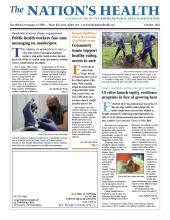
Studies on environmental justice topics by grassroots groups are available on SciCAN.org.
Photo courtesy Nortonrsxe, iStockphoto
Public health workers have a new platform for sharing resources on environmental justice.
The Science and Community Action Network offers opportunities for research, discussion and collaboration between scientists, advocates and frontline community members to help bring about health equity in historically marginalized communities across the U.S. Launched in September, SciCAN.org provides a place to build connections that protect vulnerable communities and address environmental, economic and social injustices.
SciCAN fosters open and inclusive communication, including opportunities to share research, essays and other resources, according to organizers.
“The resource library is intended to not only contain academic journals, but information from a lot of our allies and colleagues across the country in the environmental justice movement,” Beto Lugo-Martinez, administrator and co-founder of SciCAN, told The Nation’s Health. “The information can be used to advance policies at all levels.”
A standout offering of SciCan is that it gives voice not only to scientists writing peer-reviewed papers, but also to non-academic researchers and community leaders on the ground. This openness strives to cross a divide that sometimes exists between academia and the community, organizers said.
“A lot of community-led solutions come from the ground up because the community members know exactly what they’re facing, what the challenges are, day to day,” Lugo-Martinez said.
Among the resources is a nonacademic study by CleanAirNow, an environmental group in Kansas City. The group examined a neighborhood burdened by toxins from scrap metal shops and air pollutants from delivery trucks and heavy machinery. Conditions were so bad that sometimes a chemical film forms on outdoor plants.
The residents are mostly people of color who are low income. They have a life expectancy 20 years shorter than people in other neighborhoods in Wyandotte County, Kansas, the study said. Research was gathered by neighborhood social workers, who interviewed residents about problems and solution strategies.
In May 2021, CleanAirNow submitted the work with comments to Wyandotte County officials working on a general plan to aid the neighborhood. Emphasis was placed on including residents in the conversation.
“Academia really needs to embrace community-led solutions and community-led data gathering,” said Lugo-Martinez, executive director of CleanAirNow. “They have not put themselves in a place of humility in the community.”
Among journal studies available on SciCAN is one conducted in a Houston, Texas, neighborhood that is on the fence line of transportation and industry infrastructure.
Researchers used particulate wipes to collect dust from randomly selected homes. They found toxins known to cause cancers and chronic diseases. The researchers are doing more work to assess the source of the toxins and better understand neighborhood exposure.
Also available on the SciCAN website is “find-an-expert,” which enables users to connect on an issue. The feature could be used to find a local expert for a public hearing on an environmental topic or a land-use decision, Lugo-Martinez said.
The website follows the U.S. Environmental Protection Agencies’ working definition of environmental justice. EPA states that no group, regardless of race, ethnicity or socioeconomic status, should bear a disproportionate share of health-harming environmental consequences from industrial, governmental or commercial operations or policies.
More is planned this year for SciCAN, including workshops, videos and information on how researchers can build trust and collaboratively engage with communities in a way that benefits them.
For more information, visit www.scican.org.
- Copyright The Nation’s Health, American Public Health Association









